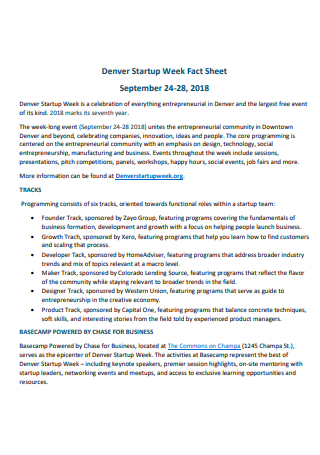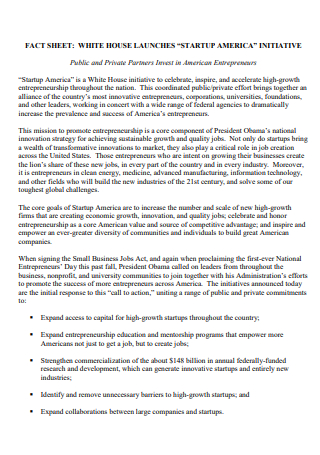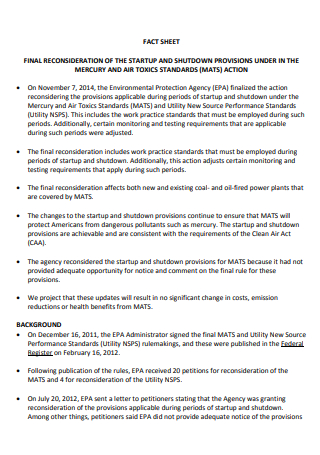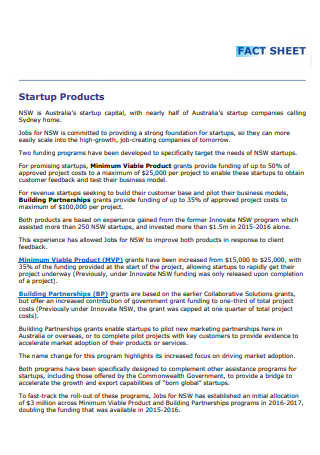3+ Sample Startup Fact Sheet
What Is a Startup Fact Sheet?
A fact sheet is the elevator pitch for your organization in the business world. It functions somewhat like advertising and can be used, but it contains facts and information about why customers should care about your new business and its items and services. The concept of a fact sheet is created in response to the diminishing attention span of the average individual. Typically, they dislike reading lengthy and tedious, especially with a new firm. Typically, it is written visually appealing so as not to lose the readers’ interest. The public pays more attention to concise documents, to the point, and aesthetically beautiful, or at least capture their interest. Statistics indicate that approximately 90% of startups fail. 10% of new businesses fail within the first year. It appears that startup failure rates are comparable across industries.
Benefits of Working in a Startup Company
Working for a startup is becoming a famous aspiration among young professionals, and it is easy to understand why. From flexible scheduling to discovering the inner workings of a growing company, employment at a startup provides several advantages. However, it is equally essential to understand the potential drawbacks of this professional path. This article examines what a startup is and the advantages and disadvantages of working for a startup. There are some advantages to working for a startup, particularly for people who are new to the workforce, such as fresh graduates or young professionals. Choosing to work for a startup can provide numerous advantages, including:
Tips for Starting a Business
Rule number one: it is not enough to have an excellent business idea to start a company. Successful entrepreneurs must analyze the market, create a realistic plan, and motivate their teams to reach their objectives. In practice, vision is only one side of the issue; knowing how to solve concrete problems and promote yourself in a competitive context are equally vital. Here are some of the fundamentals:
1. Identify the optimal market
You should ideally introduce your items or services to a young and rapidly expanding market. To distinguish oneself in more mature markets, you will need a competitive advantage, such as product or service innovation, outstanding customer service, or the correct pricing point. Therefore, you need to hire a professional research firm to help you collect as much information as possible to identify your potential markets, such as the strengths and weaknesses of your competition and the amount of time required to launch your product. Keep in mind that you will not make any sales during this period.
2. Put the proper individuals on your side
The members of your management team should possess complementary skills. The finest executives ensure that they hire the most qualified specialists in each operational area. It would help if you were not threatened to hire someone with more excellent skills than you in their respective industries. You should also consider your external resources to be members of your team. You will need technicians, salespeople, managers, a lawyer, an accounting firm, and marketing or public relations assistance. If you lack the resources to establish a board of directors, you can opt for a strategy committee and ask an expert to provide feedback on your company’s decisions. In the field of sophisticated technology, a growing number of incubators offer a variety of help to improve your chances of success. In the end, the market is the actual test. To reach customers swiftly and effectively, you should consider engaging marketing professionals from the outset. Marketing is vital for the victory of any organization while being frequently overlooked.
3. Consider the path ahead
Avoid engaging in firefighting and losing sight of your long-term goals. Make a list of all the immediate and medium-term considerations, especially if you anticipate substantial expansion. To help you manage this expansion, you must consider all available alternatives, such as buying or leasing space, furnishings, and equipment. Consider outsourcing various operations, such as human resources, rather than handling them internally. You will need to examine growth considerations in the future, such as energy and resources, raw materials, salaries, funding, and technical requirements. If your growth potential has been thoroughly evaluated, it is acceptable to think large. For instance, if you are positioned in a niche market, you may not be profitable until you begin exporting. Check with national, provincial, and regional export support services to better understand your exporting potential.
4. Get your finances in order
The founders’ savings frequently finance startups. In many instances, seeking cash from other sources, such as angel investors, venture capital firms, assistance funds, or social economy funding agencies, may be required. Be sure to complete your research and understand the expectations of investors. A businessperson who invests in firms once stated, “If you knock on a door too early, it may be closed to you later, especially when you’re ready to enter.”
5. Streamline the specifics
Many rules must be followed for your company to stay in business. For example, you have to decide what kind of legal structure your business will have, devise a way to keep track of money and follow laws about working conditions, health and safety at work, and training. You can start a business or industry under your name. A group can form either a registered partnership or a corporation, each with its rules, rights, and responsibilities. If you have more than one partner, you should write up a shareholders’ agreement to set rules for how everyone should act. You could also decide to start a cooperative or a group that doesn’t make money. Make sure to patent your ideas, or at least ensure they are protected by copyright, a registered trademark, or a trade secret. There is a chance that you are violating the rights of another company by doing this.
6. Give a plan that will get things done
Ensure that your business plan includes the elements above. Your strategy must be clear, detailed, and precisely define your business proposal. Since it is your vision, write it yourself. Expect to undergo multiple rewrites before reaching your final plan. If you need help, don’t be scared to ask for it. Show it to professionals, accountants, attorneys, or other seasoned entrepreneurs. Remember that a business plan is more than a financial document; it must sell your idea to a potential investor.
How to Write a Startup Business Plan
Anyone can have a brilliant thought. However, transforming an idea into a profitable business is a different ballgame. You may think you’re ready to create a new company. This is excellent news, and you should be delighted. Additionally, having a business plan increases your chances of getting funding for your beginning business. No bank or investor will give you a dollar if you don’t have a solid business plan. In addition, organizations with business strategies have more significant growth than those without one. Below are a few steps to get you started.
1. Ensure that your organization has a distinct mission
Make sure your company description is evident when you write it. Instead, tell people who you are and when you want to start a business. Say what kind of products or services you’ll sell and in what industry you’ll be doing business. Where will this company do business? Make it clear if you’re going to have a store, do business online, or both. Is your business in your town, region, country, or world? Your mission statement can also be part of your company description. This is an opportunity to know more about your startup’s work. The company summary makes you think about what you want to achieve. Anyone who sees it should be able to tell what kind of business you have and how you will run it. Include why you want to start a business. For example, let’s imagine you’re building a restaurant. One reason to open a restaurant could be that none in the area serves the kind of food you do. You can briefly talk about your startup company’s goals and plans, but you don’t have to go into too much detail. As you compose the rest of your business plan, you’ll go into more detail about this. Remember that this is just a summary, so there’s no need to write a lot.
2. Identify your target market
Your company is not for everyone. This is not a feasible business plan, even if you believe everyone will love your idea. Determining your startup’s target market is one of the first steps in creating a successful business. To determine who you will target, you must undertake market research—possibly the most crucial aspect of creating a small company. If there is no market for your product or service, your firm will collapse. It’s that straightforward. I often see entrepreneurs rush into a decision because they fall in love with a concept. Due to their narrow perspective, they do not perform essential research. Sadly, these enterprises do not endure. But if you take the time to design a business plan, you may find no market for your venture before it’s too late. It is preferable to obtain this information early rather than after you’ve invested substantial money in your endeavor. To determine your target market, begin with broad assumptions and refine them.
3. Examine your competitors
In conducting market research, you must also undertake a competitive analysis. This information will be used to develop your brand differentiation strategy. In drafting a business plan, your startup does not yet exist. Nobody knows who you are. Do not anticipate success if you intend to launch a carbon replica of a competitor’s product. Customers will have little incentive to convert to your brand if it is identical to one they already know and trust. Your plan for differentiation could incorporate pricing and quality. If your pricing is much cheaper than competitors, this may be your market niche. Even if you possess more excellent quality, there is a market for it. Concurrently with determining your target audience, you should undertake a competitive analysis. Both of these fall within your company plan’s market research section. Once you have identified your competition, it will be easy to determine how your business will be distinct. However, this information will depend on your intended audience.
4. Budget accordingly
When developing a business plan, you must have all your numbers in order, especially if you intend to secure investment backing. Determine the correct amount of money required to launch and maintain the firm; otherwise, you will run out of money. Running out of cash is the typical cause of startup failure. Taking the time to organize your budget before launching will reduce this danger.
5. Determine your objectives and budgetary estimates
Let’s continue discussing your finances. If you are not completely functioning, you will not have any income statements, balance sheets, cash flow statments, or other accounting papers. However, it is still possible to make projections. These forecasts can be based on the overall population of the target market in your region and the percentage of that market you believe you can capture. If you have an expansion strategy, include it in your financial predictions. While it is customary to anticipate that your l sales income to improve, you must nevertheless consider all considerations since; if you plan to open a new site in the fourth year, you must change your financial predictions accordingly. You may not be profitable until the third year of operation; however, if you open a new facility in the fourth year, you may also incur a net loss. In addition to your brick-and-mortar shops, another example of a goal could be to open an online store. Avoid bringing on more than you can chew. Keep everything reasonable.
6. Clearly define the power structure
Your business strategy should also address your startup’s organizational structure. This should be simple if your firm consists of you and perhaps one or two business partners. However, depending on how you intend to expand the business, resolving this issue as soon as possible is preferable. Before getting started, it’s essential to establish this structure. Thus, there is no argument regarding who reports to which post. It is evident who is in charge of particular individuals and departments. Do not make this overly complicated. You do not want any assignments or instructions lost in translation between levels. Also, you don’t want anyone to be uncertain about who is in authority. This is your time to explain how your business will run to board members and investors. Who makes the ultimate decisions? I understand that you may need to give up a portion of your startup’s stock to get it off the ground, but I urge keeping the reins in your own hands.
FAQs
What is a fact sheet PDF?
A fact sheet is a concise document containing facts about a company. It often comprises the organization’s mission statement, core values, and a synopsis of the products or services it provides.
What is a fact sheet’s purpose?
A fact sheet provides engaging information in a clear and concise format to readers from your target demographic. A fact sheet provides information about a business, organization, product, service, campaign, event, or other issue and can be presented on paper or digitally.
What is a startup cost?
Startup costs comprise amounts paid or incurred in conjunction with an existing for-profit activity to generate income in anticipation of the action becoming an active trade or business.
Ensuring the success of your new business is a challenging endeavor. You never know what will happen, and you’ll be flying blind most of the time. Hence, creating a good elevator pitch or fact sheet is one step towards assuring the success of your new company. Should you need any help in creating one without starting from scratch, feel free to download one of our pre-made templates at Template.net.




